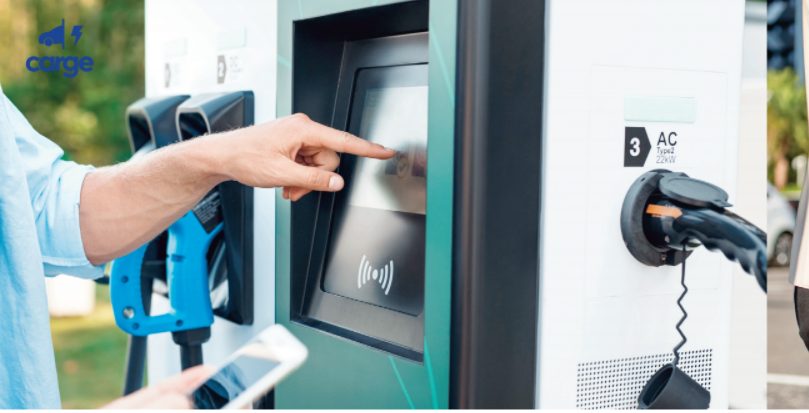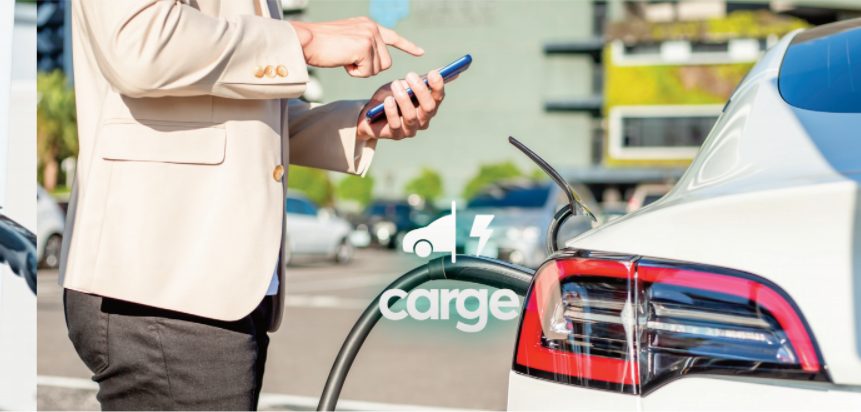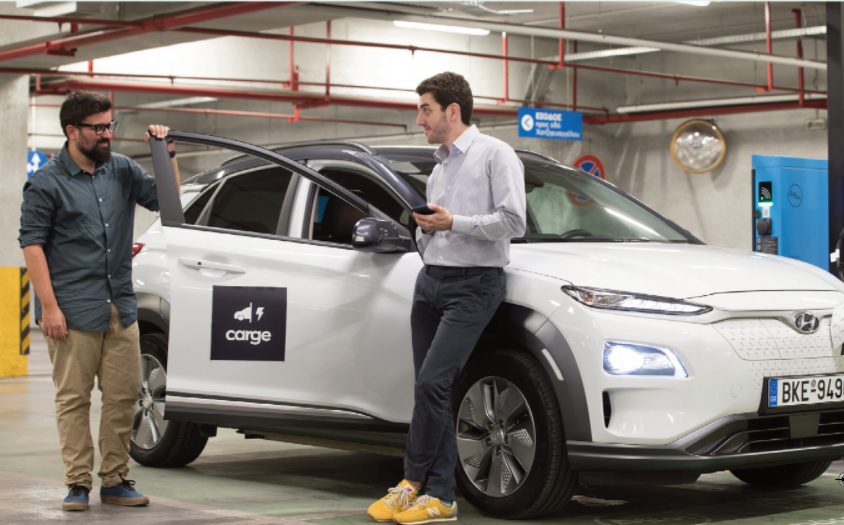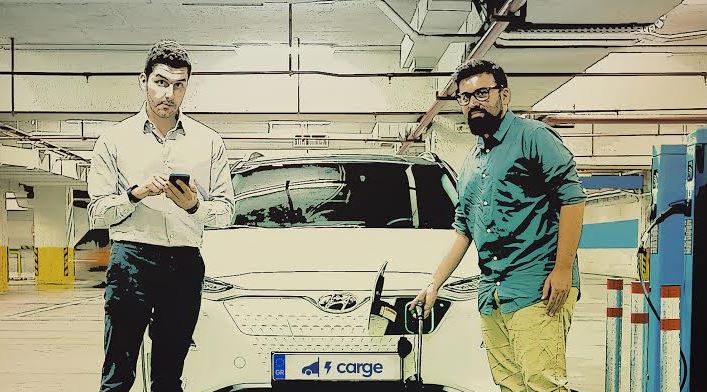Carge, like most startups, started in order to cover the need of its creators, which was obviously the need of a lot of people in Greece and abroad. We have discussed with the founders of Carge, Lefteris Karampatsakis and Petros Benos, about how a simple “let’s do this” turned into a business that serves 3,000 drivers of electric vehicles in four countries in only a year.
S.M. Could you refer to the story behind Carge?
Lefteris Karampatsakis: At the beginning of 2020, before the pandemic, I traveled for the first time with an electric car. Because I like organization, I searched prior to the trip where and when I could charge the battery. I had to download five apps, register with my personal data, prepay an amount and finally wait four days in order to receive in the post a nice letter that was welcoming me and had a plastic card attached through which I could unlock the chargers during my route. When I returned from my trip, the first lockdown came and I started wondering if I was the only one who had found the above procedure inconvenient. So I started asking Facebook groups, until I realised that all drivers were exasperated with this procedure and with the fact that you had to have five (and in the future more) apps on your mobile phone.
Then everything developed quickly. The next evening I invited my colleague then and co-founder now, Petros, letting him know that it is essential to find an app that will solve the most important problem of a driver. He started flooding me with questions and then started building a structure in his mind that was making sense (technically) and after a short market research we realised that there were similar solutions in northern Europe. “It’s a matter of time before they arrive in Greece”. Petros said that night. “Let’s do this first” I answered and we agreed to take advantage of the unique chance of the virgin field of electromobility in Greece and in the countries of southeastern Europe. Apparently, the fact that we already knew and trusted each other helped a lot. At the same time, because of our connection with the Startup community, we had great advisors that still help us today.
We are a group of four in-house people and five contractors, with our base in Greece, who help the drivers of electric cars to seek, use and pay whichever recharge station throughout Europe, serving now more than 3,000 drivers in four countries ( Greece, Romania, Hungary, Italy) in their own language. In just a few months, Carge is member of the Hellenic Institute of Electric Vehicles (official partner of AVERE) , while it has received the Top15 EU Startups Award, the Gold Mobility Award in the EV Charging category and a few days ago won the Envolve Award Greece.
S.M. How could we define Carge? Is it a company-advisor for the driver of an electric car?
Petros Benos: If we could define Carge in a sentence, that would be: “The digital key of the electric car”!
The map and the battery recharge services are only a part of Carge app. We operate as the driver’s personal advisor, we display vehicle data concerning battery use, offer the chance to control remotely tens of the vehicle’s operations ( windows, air-conditioning) for ecologic driving, we predict and compare prices among different hours to offer our users the best experience.
S.M. Which are the main services that Carge offers and on which sector of the market?
L.Karampatsakis: Carge’s main service is the realization of electric vehicles charging conferences and their payment transactions easily and simple!
At first glance, we are B2C.However, there are some ad-hoc projects that we have conducted for big companies in order to help them accelerate their network’s interoperability procedures and therefore we touched B2B,without though focusing on that for the time being.
Besides that, there are two complementary services, which for now are available only in Italy. The first one offers the potential for advanced booking and parking after each charging , so the driver feels safe knowing that that his charger is available for him at a specific hour/day or that noone will “reprimand” him because he stayed more in front of the occupied station.
The second operates with smart ground sensors which can be found in advanced charging stations of big companies (Ionity, EnelX, Virta) and promote the concept of the “smart city”.
Finally, we are very happy and proud that we have achieved to stand out, by launching a solution that is not particularly apparent,but the experts know it exists. Smart charging is part of electromobility and of each country’s future plans for network balance and to avoid peak hours when the demand for electricity reaches unprecedented numbers.
Given that we are a company that doesn’t operate chargers (hardware) , but we connect with them through the electric vehicles, we have decided to follow the hard road. Through the connectivity with each vehicle separately ,we offer the potential , if the user wants to, to expand charging time and finally pay the kWh less, but at the same time contribute to the avoidance of the so-called “peaks”.
Additionally, we encourage the driver to charge at specific hours, if he isn’t in a rush, at a lower cost through the specific predictions we perform for every area.

S.M. How do you make a profit? How have you covered the needs of the initial funding?
L.Karampatsakis: We make a profit from the agreed discount of the kWh price that each provider gives us, the station’s booking service and the parking service. The user does not pay anything more but the cost of the consumed energy. The same price that he would pay if he had downloaded the app of the provider or charge point operator.
We covered the needs of the initial funding from angel investors who trusted the founders and the idea before the realization. An essential point of our funding process is the day we resigned from the previous company ( Syncbnb), where Petros and I were working. The two co-founders of Syncbnb directly made a proposal to fund our new venture. This was a confidence vote and a positive sign for what followed.
S.M. How do you see the future of the EV charging market?
L.Karampatsakis: In the future the EV charging market will have a lot of dynamic branches which will create new working positions and expertise and it is important to notice how fast the way a car battery charges has evolved. Four years ago someone had to have a RFID card, now he can charge only with one app and tomorrow, literally, he may charge in motion. Players who deal with battery technology and the software of chargers/vehicles will be benefited before 2030, as we talk about a market that expands at a rate of 25% every year.
It’s worth mentioning that for these charging services the strategic cooperations, with companies that sell, rent and insure electric vehicles, will play a significant role. From the very first day of our operation, we set the goal to build cooperations with big players who will reinforce our presence and will build the driver’s trust for a new company.
S.M. Which company do you consider as your biggest competitor, VW, Shell or a payment super-app?
P.Benos: As our biggest competitor we could consider VW if we assume that it has all the resources to create an app that will unite all the charging networks towards the benefit of its drivers-customers. This could as well benefit us, since instead of creating something new it may absorb an already existing solution such as the one of Carge.
S.M. The payments and Fintech sector are generally crucial and basic elements of all digital services. How do you approach this issue?
L.Karampatsakis: Payments processing and clearance consist the main element of our app’s core. In the case of Carge, the money have to do with the entire energy cost ,so we have assured transactions in cooperation with companies of this sector.
A service that will be added within the next few months for the relief of our users is the charge-now-pay-later. There are times when the bank of a card ( mostly in other countries) rejects the charge but the driver is trapped because charging can’t stop if the payment has not been completed. Consequently, soon he will be able to pay later, but slightly more expensive because of the facilitation we offer.

S.M. The company is based in Athens but you operate on a european level. Which are the challenges for a greek company that wants to do business abroad?
P.Benos: The first challenge we had to face in Romania was the agreement with the charge point operators that didn’t pay much attention. After the first contacts with big players this changed and started seeing us as “an innovative solution which came from abroad”. The second challenge was the technical issues with the chargers and the fact that we couldn’t be on-the-spot to perform an autopsy and find the problem. That’s why we decided to to recruit a team of testers drivers who charged for free their car but also helped us significantly by reaching the stations and staying there until the problem was solved through remote control. Without them we wouldn’t have this result today.
L.Karampatsakis: Due to the pandemic it was practically inevitable to travel so we found drivers who were willing to help in every city. If we were in their position we would do the same if we could see that a solution which will help everyday is being prepared and as a return we take back free chargings while offering valuable feedback. We have invested a lot of hours making calls with the drivers and learning what’s available in their country, how providers work there and the ways of charging.
The drivers, seeing how much attention we paid to them, became passionate with the product and then turned into brand evangelists by creating YouTube videos and uploading our app on Viber or whatsapp.All of a sudden we were in the top10 of apps about cars and transport for Androids in Romania. Also, the pandemic helped remote meetings with the energy providers and charge point operators, because «zoom is the new normal». So for the time being we operate here in Athens.

S.M. We would like to ask our classic question: What do we have to do as a country and as a Startups ecosystem in order to have more companies like Carge? Which are the challenges and the problems you have faced in your business course?
L.Karampatsakis: For a start the provisions and the privileges that are given to the startups now weren’t available three or four years ago. So, we have reached a good level but more attempts should be made, though.
The biggest challenge we faced was to convince the charge point operators in Greece that we are not competitors , but a complementary product than enhances their revenue and reduces running costs. This demanded meetings and training about what we do for almost four months.
P.Benos: I think that the biggest problem we have faced so far was when we realised that almost half of the greek companies have placed chargers that do not communicate in order to connect with them. Apparently for marketing reasons , they wanted initially to install the stations and then work on the connectability and management. This ruined our plans and therefore we first started in Romania in March and in Greece in April though the initial plan was to start in January. At this point becomes evident how flexible you should be in order to overcome such obstacles.
S.M. Is there a lack of talents especially in computer science? How do you approach the issue of finding and developing the appropriate staff?
P.Benos: There are a lot of capable people and especially in computer science you can find talents with extensive experience who could easily work in great companies. However, it is important to give the necessary incentive to them to feel certain about working with you. In the field of discovering and assessing applicants , there are interesting platforms which provide the profile data that fit the company’s DNA.
S.M. Electric cars’ charging is not an autonomous and detached procedure, but it has many parameters such as home charging, energy communities and smart city’s infrastructure. How do you see Carge in this framework in the future? Can Carge become the “AirBnB of electric charging”?
L.Karampatsakis: As one of our investors advised us a few months ago, there are the t5, t10, t100 time ponts and we should look at t100 in order to organise a proper service package which will worth a lot in the future. Carge’s presence in the infrastructure of an ideal, smart city will play a leading role and will assist a lot and different factors in this new ecosystem.
I am not sure if Carge can become the “AirBnB of electric charging”, mostly because I don’t reject something before I try it. However, it is something quite distant from public charging with which we deal. What’s important is that we have started talking with the providers the potential of adding and connecting the home charger into Carge’s app,again towards the benefit of the driver, in order to monitor and control everything through an app.


